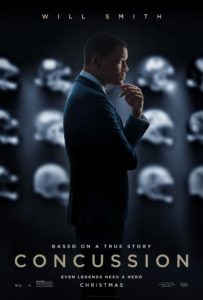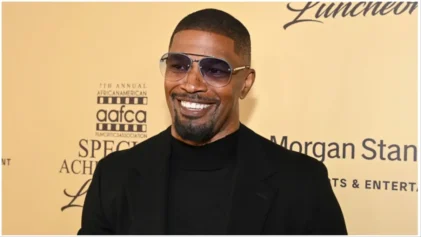Will Smith’s upcoming film is stirring up some controversy, and it hasn’t even hit theaters yet. The movie is called Concussion, and it’s reportedly causing the NFL a bit of a headache.
The Sony biopic tells the story of Nigerian forensic pathologist Bennet Omalu, who discovered a degenerative neurological disease called chronic traumatic encephalopathy, or CTE. The disease causes depression, dementia, and other behavioral changes in football players after repeated head trauma.
Dr. Omalu presented his research to the press and the NFL in 2005 but was not met with open arms by the league. The NFL, instead, attempted to discredit his findings and allegedly blackball him in the science community. It was an odd tactic, considering that Dr. Omalu specializes in neuropathology.
Omalu’s discovery of CTE came after performing the autopsy of former Pittsburgh Steelers player Mike Webster, who publicly appeared to have gone crazy in the late 1990s and early 2000s. Though the NFL opposed Omalu’s work, a string of suicides by former NFL players—all of which were found to have CTE—brought his research to greater prominence and forced the NFL to acknowledge that concussions were an issue.
A 2009 GQ profile on Dr. Omalu’s battle with the NFL, titled “Brain Game,” forms the basis for Concussion. While there is some talk of Oscar buzz for Smith who portrays Dr. Omalu in the film, there’s even more buzz about how big of a problem the movie may cause for the NFL.
Recent headlines suggest that the film delivers some serious blows to the league’s reputation, while a New York Times article published on September 1 claims that emails leaked during the big Sony hack reveal that the film may have been “watered down” by Sony executives in order to avoid rattling cages over at the NFL. However, Sony Pictures issued a statement to NBC on September 2, refuting those claims.
“As will become immediately clear to anyone actually seeing the movie, nothing with regard to this important story has been ‘softened’ to placate anyone,” a spokesperson said.
Meanwhile, the NFL has been doing some preemptive damage control, according to The Hollywood Reporter, welcoming any open dialogue the film may spark and holding a series of conferences and scientific strategy meetings on player safety in the months leading up to Concussion‘s release.
“When something like this movie comes up and people want to talk about concussions or football or the future of the sport, that’s an opportunity for us to engage,” Jeff Miller, NFL senior VP of health and safety policy, said to The Hollywood Reporter.
Miller even went so far as to say that the league would be happy to partner with Sony to raise awareness for concussion safety in the sport. “The studio hasn’t asked, and if they were to, and it gives us the opportunity to talk about the health and safety of our sport, we would do that, Miller added.
That’s a much warmer reception than the NFL gave to Dr. Omalu. Neither Omalu’s name nor his research has been mentioned in any of the NFL’s recent statements. The NFL also effectively limited the reach of a 2013 documentary about Dr. Omalu and the NFL called League of Denial: The NFL’s Concussion Crisis. The organization allegedly pressured ESPN, initially a partner on the project, to back out of the documentary that was based on a book written by two ESPN reporters.
Omalu’s work is important for all professional athletes, but particularly to the predominantly Black NFL and the young Black players who aspire to be in the league—athletes who need to be informed, protected, and treated for the disease that the NFL has tried to discount.
Since his discovery of CTE in Mike Webster, Dr. Omalu has examined the brains of at least 16 other former NFL players, who each died by some self-inflicted injury, and found CTE in all of them. He has received the backing of many doctors and scientists outside of the NFL’s roster. Some of those scientists were even hand-picked by the league to conduct their own examinations of the brains and were subsequently ignored by the NFL when their findings supported Dr. Omalu’s.
Regardless of whether the NFL acknowledges the validity of Omalu’s research, they certainly won’t be able to dismiss it after it is given such public treatment as a Hollywood movie. With at least 17 cases of CTE diagnosed in NFL players, 5000 ex-players who sued the league for damages resulting from concussions in 2013, and thousands more who are or will be affected by them in the sport, Concussion may be putting a necessary spotlight on the biggest issue facing the NFL. And Will Smith may just be putting on the most important performance of his career to-date.



